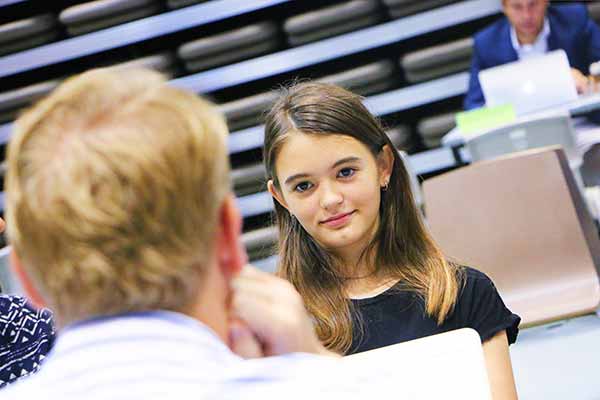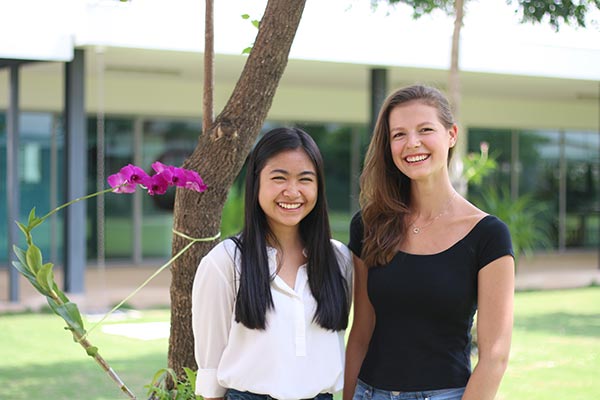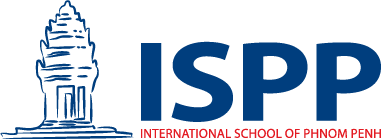Mother Tongue
ISPP’s Philosophy of Mother Tongue
The International School of Phnom Penh believes that it is vital that all students have the opportunity to maintain and develop their Mother Tongue (the main language that the student uses at home) wherever feasible. The following extracts are recommendations from the IB.
The research on mother-tongue maintenance and development (Cummins and Danesi, in Baker and Prys Jones, 1988) is particularly significant. This research indicates that students following a mother-tongue maintenance and development programme receive the following benefits:
- They avoid language loss and the resultant negative effects, for example, subtractive bilingualism(where developing a second language is detrimental to the first language). They perform at least as well (often better) in mainstream subjects (science, humanities, etc) as monolingual students.
- They perform at least as well (often better) as second-language students who don’t maintain their mother tongue and are schooled wholly in the second language.
- They retain a positive attitude toward their mother tongue and cultural background when the school accepts the mother tongue language, accounting for increased self-esteem and its resultant benefits.
Based on educational research, ISPP believes that students with a strong mother tongue, and those who continue to develop, are far more successful in learning and functioning in another target language. Therefore ISPP is continuously looking for innovative ways to facilitate the maintenance of your child’s Mother Tongue.
The Mother Tongue Programme – Not a Foreign Language Course
 The purpose of the programme is to provide the opportunity for all students to develop appropriate skills in their mother tongue according to their age level. The Mother Tongue Programme is not a foreign language course. Therefore, children should be proficient in a language, often one which is spoken at home by at least one parent. To make a best-fit placement based on each student’s language profile, the school may determine if a particular student meets the requirements to join a Mother Tongue class.
The purpose of the programme is to provide the opportunity for all students to develop appropriate skills in their mother tongue according to their age level. The Mother Tongue Programme is not a foreign language course. Therefore, children should be proficient in a language, often one which is spoken at home by at least one parent. To make a best-fit placement based on each student’s language profile, the school may determine if a particular student meets the requirements to join a Mother Tongue class.
Please see the Mother Tongue information for the Middle Years Programme and the Diploma Programme below.
MOTHER TONGUE AND THE MIDDLE YEARS (GRADES 6-10)
If students are entering into the Diploma and the Language self-taught option (see the Diploma section), it is important they maintain their Mother Tongue language acquisition. There are two possible ways of accomplishing this:
- The student takes Mother Tongue lessons during the Language Acquisition (Foreign Language) timetabled period instead of a foreign language with a recognized teacher/tutor of the school’s choosing.
- The student studies Mother Tongue after school with a recognized teacher/tutor of the school’s choosing as part of the school’s after school program.
For further information about the Mother Tongue Programme for MYP students, please contact Ms Elizabeth Ramey, our Language Acquisition Learning Leader for World Languages at [email protected], or Mr Matt Clouter at [email protected], IB Middle Years Programme Coordinator.
EAL and Mother Tongue
For students who receive English as an Additional Language (EAL) Support in Grades 6-10, some levels of support include compulsory Mother Tongue language instruction. See the Secondary EAL section of the website here for further information.
MOTHER TONGUE AND THE DIPLOMA PROGRAMME (GRADES 11-12)
 In the Diploma Programme (Grades 11 & 12), students may opt to study their mother tongue as a Self-taught Language A: Literature course in the SSST (School Supported Self-taught) Programme. This is available at the standard level (SL) only and the course may be chosen by both IB and ISPP Diploma students. As a part of the SSST Programme, the school seeks to source a tutor who supports students in their study of the literature in the Mother Tongue. Students opting to follow a self-taught course must be competent language users, have strong self-management skills, and have a keen interest in studying literature.
In the Diploma Programme (Grades 11 & 12), students may opt to study their mother tongue as a Self-taught Language A: Literature course in the SSST (School Supported Self-taught) Programme. This is available at the standard level (SL) only and the course may be chosen by both IB and ISPP Diploma students. As a part of the SSST Programme, the school seeks to source a tutor who supports students in their study of the literature in the Mother Tongue. Students opting to follow a self-taught course must be competent language users, have strong self-management skills, and have a keen interest in studying literature.
Students who opt to follow the Self-taught Language A: Literature course will also need to take an additional language subject (Language A or Language Acquisition). Language A students will be eligible for a bilingual diploma.
For questions dealing with the Mother Tongue Programme for Diploma students, please contact Ms Lucie Lecocq-Otsing, IB Diploma Programme Coordinator at [email protected].
Secondary
Learn More
Click on a topic below to learn more about our secondary education programme.
Footer
Join Us
Make an inquiry or schedule a tour to find out more about our beautiful campus and unique education programmes.
